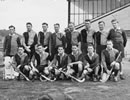New Zealand rowing’s first golden era
What is seen as the first golden era of New Zealand Olympic rowing, from 1968 to 1976, coincided with the coaching reign of Rusty Robertson.
Anthems at the Olympics
Until the 1972 Montreal Olympics the national anthem that was officially played for New Zealanders at Olympic medal ceremonies was ‘God save the Queen (or King)’. Only at Empire and Commonwealth Games was ‘God defend New Zealand’ played. The 1972 medal ceremony for the rowing eight was notable for being the first time ‘God defend New Zealand’ was played instead of ‘God save the Queen’. ‘God defend New Zealand’ had, however, been played once before at the Olympics. At Yvette Williams’s medal ceremony at Helsinki in 1952, the Finnish band played it as well as ‘God save the Queen’.
The New Zealand eight were gold-medal favourites at the 1968 Mexico City Olympics but, suffering from lack of oxygen in the high-altitude environment, they only managed fourth place. However, New Zealand still had a finals day to remember when the coxed four, Warren Cole, Ross Collinge, Dudley Storey, Dick Joyce and Simon Dickie (cox), won gold.
At the 1972 Munich Olympics the New Zealand eight dominated the final race. Gary Robertson, Trevor Coker, Athol Earl, Lindsay Wilson, John Hunter, Dick Joyce, Wybo Veldman, Tony Hurt and Simon Dickie won gold comfortably.
The New Zealand coxless four of Noel Mills, Ross Collinge, Dudley Storey and Dick Tonks won silver on the same day, pushing the champion East German crew all the way in the final.
By the 1976 Montreal Olympics the Rusty Robertson era was winding down, but the New Zealand rowing eight were still good enough to grab the bronze medal behind East Germany and Britain.
Team size and travel methods
In the earliest years of the Olympics, sea travel was the only option, and the expense and length of travel time restricted New Zealand’s team sizes. Twenty-one New Zealand athletes made the 17-day voyage to California for the 1932 Los Angeles Olympics. Fifty-three voyaged the much shorter distance across the Tasman to the 1956 Melbourne Olympics. The first time a New Zealand Olympic team travelled by air was in 1952, when 15 New Zealand athletes flew to Helsinki, their journey taking a week in short stages. From the 1960s cheaper and faster air travel allowed larger teams. Thirty-seven New Zealanders went to the 1960 Rome Olympics, and at Munich in 1972, New Zealand fielded a team of 97.
Hockey’s great day
At the 1976 Montreal Olympics the New Zealand men’s hockey squad won a surprise gold medal. The New Zealanders survived two extra-time thrillers against Spain and the Netherlands to qualify for the final against Australia.
With 13 minutes remaining in the final, New Zealand goalie Trevor Manning saved a powerful shot by Australian Ian Cook. The ball hit Manning in an unprotected spot just above his leg guard’s knee roll. Despite the pain Manning played on, later discovering he had a broken kneecap. New Zealand, up 1–0 by virtue of a Tony Ineson goal, hung on to win a famous victory.
A trio of running greats
In the 1970s New Zealand had three great Olympic middle- and long-distance track runners: John Walker, Dick Quax and Rod Dixon.
Dixon was the first to win an Olympic medal with a bronze in the 1,500 metres at Munich in 1972.
At the 1976 Montreal Olympics, Quax and Dixon ran longer distances. In the 5,000-metres final, defending champion Lasse Viren of Finland was too good, with Quax a pace away in second place. Dixon looked to have secured third place until Klaus-Peter Hildenbrand of West Germany dived at the line and deprived him of the bronze.
With world-record holder Filbert Bayi of Tanzania unable to compete, John Walker won the gold medal, running as the red-hot favourite.
